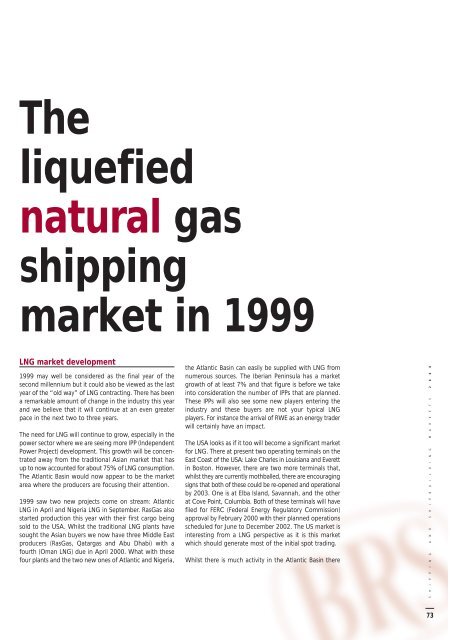Create successful ePaper yourself
Turn your PDF publications into a flip-book with our unique Google optimized e-Paper software.
The<br />
liquefied<br />
natural gas<br />
shipping<br />
market in 1999<br />
LNG market development<br />
1999 may well be considered as the final year of the<br />
second millennium but it could also be viewed as the last<br />
year of the “old way” of LNG contracting. There has been<br />
a remarkable amount of change in the industry this year<br />
and we believe that it will continue at an even greater<br />
pace in the next two <strong>to</strong> three years.<br />
The need for LNG will continue <strong>to</strong> grow, especially in the<br />
power sec<strong>to</strong>r where we are seeing more IPP (Independent<br />
Power Project) development. This growth will be concentrated<br />
away from the traditional Asian market that has<br />
up <strong>to</strong> now accounted for about 75% of LNG consumption.<br />
The Atlantic Basin would now appear <strong>to</strong> be the market<br />
area where the producers are focusing their attention.<br />
1999 saw two new projects come on stream: Atlantic<br />
LNG in April and Nigeria LNG in September. RasGas also<br />
started production this year with their first cargo being<br />
sold <strong>to</strong> the USA. Whilst the traditional LNG plants have<br />
sought the Asian buyers we now have three Middle East<br />
producers (RasGas, Qatargas and Abu Dhabi) with a<br />
fourth (Oman LNG) due in April 2000. What with these<br />
four plants and the two new ones of Atlantic and Nigeria,<br />
the Atlantic Basin can easily be supplied with LNG from<br />
numerous sources. The Iberian Peninsula has a market<br />
growth of at least 7% and that figure is before we take<br />
in<strong>to</strong> consideration the number of IPPs that are planned.<br />
These IPPs will also see some new players entering the<br />
industry and these buyers are not your typical LNG<br />
players. For instance the arrival of RWE as an energy trader<br />
will certainly have an impact.<br />
The USA looks as if it <strong>to</strong>o will become a significant market<br />
for LNG. There at present two operating terminals on the<br />
East Coast of the USA: Lake Charles in Louisiana and Everett<br />
in Bos<strong>to</strong>n. However, there are two more terminals that,<br />
whilst they are currently mothballed, there are encouraging<br />
signs that both of these could be re-opened and operational<br />
by 2003. One is at Elba Island, Savannah, and the other<br />
at Cove Point, Columbia. Both of these terminals will have<br />
filed for FERC (Federal Energy Regula<strong>to</strong>ry Commission)<br />
approval by February 2000 with their planned operations<br />
scheduled for June <strong>to</strong> December 2002. The US market is<br />
interesting from a LNG perspective as it is this market<br />
which should generate most of the initial spot trading.<br />
Whilst there is much activity in the Atlantic Basin there<br />
S H I P P I N G A N D S H I P B U I L D I N G M A R K E T S 2 0 0 0<br />
73


